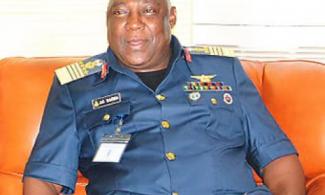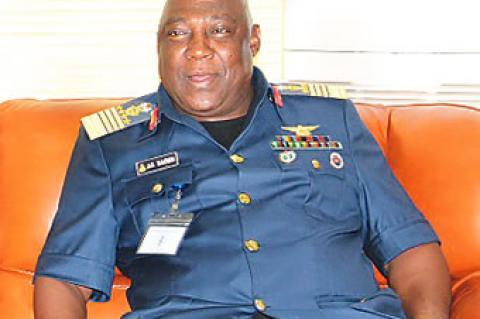
The proceedings of Alex Badeh's trial, last week, threw up an amazing fact that lodged itself in my head, and at once, became its indigestible cud: Nigeria is an ecosystem that permits public officials to comfortably bleed public funds on a stable timetable!

First, I apologize. I blush to deploy one of the markers of female physiology as a metaphor. I reluctantly adopted this exclusively feminine experience and juxtapose with it with a vicious dysfunction in Nigeria’s body politic –at the risk of being hastily read as a misogynist –because Badeh’s clockwork criminality illustrates the irony of a pervasive plague serving as one of the measures of the system’s wellbeing.
I settled for 'menses' out of imposed helplessness. A word free of apparent sexist slant would have been ideal. But my repertoire and flight of imagination availed me no option that is comparably apt for framing the repetitious, month-by-month thievery he perpetrated as Nigeria's Chief of Air Staff.
A prosecution witness, a former Director of Finance and Account of the Nigerian Air Force (NAF), retired Air Commodore Salisu Abdullahi, told an Abuja High Court that Badeh did not steal from the Nigerian Air Force as an erratic endeavor. Badeh stole as a scripted and scheduled business, over and over again.
It took Abdullahi six hours to detail how Badeh, through him, siphoned 558. 2 million naira from NAF account every month…for fifteen months!
Abdullahi said Badeh would draw 558. 2 million from the Personnel and Emolument account as fund meant for ‘’general administration of the Chief of Air Staff.’’
NAF’s total wage bill at the time was about 2 billion naira. But NAF received double that amount in the personnel and emolument account. The difference between the wage bill and the monthly allocation ranged between 1.6 billion naira and 1.7 billion naira. Badeh allotted 558.2 million naira of that remainder to himself, instructed that it be changed into dollars, and delivered personally to him month after month.
No paper trail followed this recurring monthly transaction. No document evidenced the monthly disappearance of half a billion naira from NAF funds. Badeh’s word of mouth order eliminated the need for the accountants to break a sweat on sham documentation!
Abdullahi further told the court how he helped Badeh purchase a retirement home at 6 Ogun River Street, Off Danube Street, Maitama, Abuja with the dollar equivalent of 1.1 billion naira.
He also bought, on Badeh’s behalf, a property valued at 150 million in Yola and built him a plaza in Wuse 2 area of Abuja that cost 1 billion naira.
As the testimony lingered, it became clear that Abdullahi, who revered Badeh and referred to him as ''my chief'', was less of a military professional and more of Badeh’s proxy thief and real estate agent!
But the confessions had a more baffling part.
Badeh bought his kids houses too. Though, he had procured quite a respectable number of houses his children were supposed to inherit, he proceeded to buy them their own houses.
He bought his first son a house in Abuja at 260 million naira, renovated it with 60 million naira, and furnished it with furniture of 90 million naira.
He bought his second son a house worth 340 million. The kid visited the address, checked over the mansion…and rejected it!
According to Abdullahi, ‘’When Kam saw the house, he didn’t like it. When my chief saw it, he said we should look for another one.’’
Badeh, the loving father, apologized to his son –a rare thing for a General to do, mind you! He asked to be forgiven the error of buying a house that didn’t suit the boy’s sophisticated architectural taste. And he hastened to remedy his mistake: He shelled out 330 million… and bought his beloved son another house!
This time, it went well. The boy loved the house. And daddy was delighted that his son did not hate the new gift!
Badeh had a ‘houses for all’ policy for his kids: Which should easily recommend him as the most thoughtful family man that ever stole with a Chief of Air Staff badge!
Now, the little drama of Kam’s rejection of the first house and his father’s penance offers us a glimpse into the boy’s relationship with his father.
We note that Kam rejected the multimillion naira worth gift and suffered no rebuke from his indulgent father.
We observe that Kam didn’t fear that the General would admonish him and drill into his head the story of how hard he worked and how long he saved to accumulate billions to be able to buy houses whenever the fancy takes him.
Badeh could make no such boast. He could not pose like he had earned the money. He knew that he had no voice to tell his son off.
We detect that Kam had intuited that he only needed to affect a dislike for the house and his in-season-and-out-of-season Santa Claus father would pacify him with a better one. The boy did not worry that he might lose the house if he complained: He was sure his daddy would buy him his dream mansion.
We decipher that Kam’s mind didn’t associate his father’s wealth with legitimate earning. He knew his father commanded more wealth than his salary could explain. His daddy could afford the gift of another house.
Kam had seen a courier in uniform bring his daddy a sackful of cash every blessed month. The boy knew that the monthly supply was a constant. Money came to their house every 30 days.
Kam knew his father warehoused the unspent part of the monthly largesse in his bedroom. EFCC stumbled on a treasure trove of $ 1 million Badeh had tucked away in some corner of his bedroom!
The big problem here is that Badeh reared potential crooks. He modeled thievery to his children. He taught them that clever folks devise means of stealing on the job and dumb ones content themselves with their wages.
He taught his kids that it was politic to bring home stolen goods. He showed them how to pack their bedroom full of spoils. He taught them they could lay their heads on a pillow stuffed with loot, and enjoy a sweet sleep!
It is instructive that Badeh, the Chief of Air Staff turned Thief of Air Staff, rose to the headship of the Nigerian military as Chief of Defense Staff in spite of and because of his abject ethical poverty!
But there is a context to this: Badeh’s predecessor as Chief of Air Staff is under EFFC investigation. Badeh's successor, Air Marshal Adesola Amosu and the account officers he collaborated with, former Chief of Accounts and Budgeting of NAF, Air Vice Marshal J.B Adigun, and former Director of Finance & Budget of NAF, Air Commodore O.O Gbadebo, have corruption cases: EFCC confiscated properties worth over 5 billion naira traceable to them.
EFFC found $140,000 stored in a safe in Amosu’s home. The agency also recovered 381 million naira from a company his wife used to launder money on his behalf.
So this trend proves that routine theft was second nature in that climate. There was a tradition of corruption in that milieu. And it’s probable that that culture persists even under the incumbent Chief of Air Staff.
The system repeatedly relived its own impoverishment. Every month, Badeh disappeared a specific of sum of money from the NAF account and poured into the black hole of his pocket. He performed it like a ritual. The theft was regular, predictable and inviolable.
And it was a criminal 'menses'. A phenomenon of sacrosanct timing. It happened every month. A measured hemorrhage. A calibrated loss. Fixed at half a billion naira volume. Hidden from the public.
The frequency of the flow (once every month), its certain fixture (the loss occurred every monthend –without fail!), and its protected secrecy (Badeh managed it as a private affair) endowed the looting of the public money with the similitude of the hormone-regulated periodic blood loss from the pubic region!
Badeh and his courier became inured to the anxiety that accompanies the violation of the law, as they reenacted the plunder month after month. The force of habit recreated them. It transformed them into rogue robots, cued to steal!
Here's the lesson to be learned from Badeh’s ‘menses’: Arresting thieves after the fact should be but a subset of Nigeria's anti-graft strategy. We should be more invested in uprooting the structures that facilitate Badeh’s kind of rhythmic robbery. We should be working to reinvent our public institutions so that they are inherently able to starve public officials of the opportunity to prey on loose money.
A meaningful war against corruption would entail altering frameworks that enable abnormal normality, abolishing spaces that nourish cyclic theft, and outfitting our public offices with technology-based checkmate systems that ring an alarm when someone violates the rules.
That’s the way to reduce the possibility that another serial thief like Badeh would rise to the headship of a government institution, loot till retirement, and then cry that the state’s subsequent effort to separate him from his criminal acquisition is persecution!
[email protected]
@EmmaUgwuTheMan